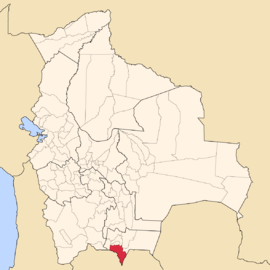Aniceto Arce Province
Aniceto Arce (or short: Arce) is a province in the southern parts of the Bolivian department Tarija. The province is named after Aniceto Arce Ruiz (1824-1906), President of Bolivia from 1888 until 1892.
| Location in Bolivia | |
|---|---|
 | |
| Main Data | |
| Capital | Padcaya |
| Area | 4,910 km2 |
| Population | 52,570 (2001) |
| Density | 10.7 inhabitants/km2 (2001) |
| ISO 3166-2 | BO.TR.AA |
Location
Aniceto Arce province is one of six provinces in the Tarija Department. It is located between 21° 45' and 22° 53' south and between 64° 06' and 65° 02' west.
The province borders Cercado Province and José María Avilés Province in the north, the Republic of Argentina in the west and south-east, Gran Chaco Province in the east, and Burnet O'Connor Province in the north-east.
The province extends over 140 km from north to south, and 100 km from east to west.
Population
Main idiom of the province is Spanish, spoken by 80.7%, while 8.6% of the population speak Quechua, 1.0 speak Aymara, and 0.2% Guaraní.
The population increased from 44,713 inhabitants (1992 census) to 52,570 (2001 census), an increase of 17.6%. - 42.9% of the population are younger than 15 years old.
55.4% of the population have no access to electricity, 51.4% have no sanitary facilities.
42.1% of the population are employed in agriculture, 0.1% in mining, 10.2% in industry, 47.6% in general services (2001).
87.4% of the population are Catholics, 8.9% are Protestants (1992).